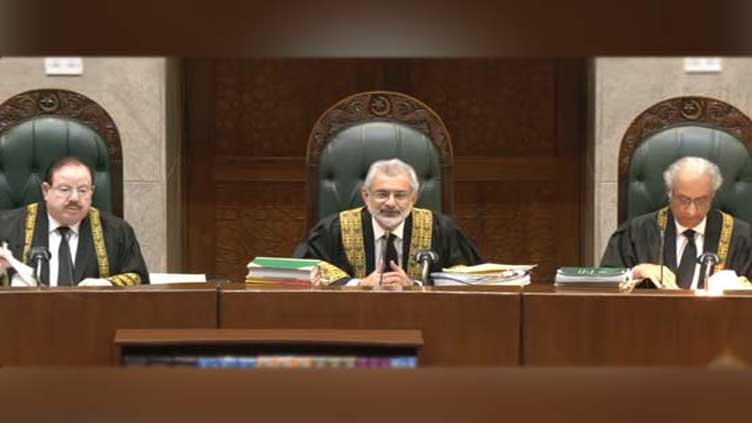Federation submits response in SC practice and procedure act case

Pakistan
Federation submits response in SC practice and procedure act case
ISLAMABAD (Dunya News) – The federation submitted its response to the apex court on Thursday, in the ongoing proceedings to review a series of petitions challenging the Supreme Court (Practice and Procedure) Act, 2023, which began on September 18.
A full court bench, presided over by Chief Justice of Pakistan Qazi Faez Isa, is currently hearing these consolidated review petitions against the Supreme Court (Practice and Procedure) Act, 2023 — a legislation introduced by the former coalition government.
The Supreme Court (Practice and Procedure) Act, 2023, mandates the establishment of benches to address constitutional matters of significant public importance. These benches will be formed by a committee composed of three senior judges from the court.
Back in April, the Supreme Court, in a preemptive move, prohibited the government from enacting the bill aimed at reducing the authority of the chief justice of Pakistan once it becomes law.
During the last hearing on September 18, Attorney General for Pakistan (AGP) Mansoor Usman Awan and two other lawyers presented their arguments, following which the court adjourned the hearing until October 3. Before adjournment, the parties' lawyers were instructed to submit their written arguments by September 25.
The federal government responded to five questions posed by the full court.
In its response, the federation asserted that the suspension of the bill by the eight-member bench was unconstitutional.
Read also: CJP rules three-judge panel to determine bench composition
It argued that the former chief justice of Pakistan (Umar Ata Bandial) suspended the law, constituted a bench and issued judgments, arguing if the law was upheld, judicial protection should be given to the decisions made so far.
The federation contended that a right of appeal might be conferred through ordinary legislation under Article 184(3). It also observed that under Article 184(3), an aggrieved person had no right of appeal except in revision.
The reply pointed out that the Article 204 of the contempt of court did not provide the right of appeal. It added that parliament, by enacting legislation, provided the right of appeal in contempt of court cases. It further emphasised that the independence of the judiciary was further ensured through the Supreme Court (Practice and Procedure) Act, 2023.
The federation argued in its response that this law would bring transparency and democracy to bench formation. It stated that the law structured the unlimited discretionary powers of the chief justice of Pakistan.
The federation also highlighted that under the law, the larger bench would hear cases under Article 184(3), and the law could not be declared null and void based on presumption alone.
The federation contended that if any future law restricted judicial powers, the court could review it.
It argued that endless discretionary powers tend to undermine the system and that the law could not be invalidated on this ground. It also stated that there would be no right of appeal against the decision of the full court.
The reply noted that the full court was only constituted in exceptional cases, and the chief justice would be the master of the roster. It also mentioned that parliament, through legislation, could render court decisions ineffective.

